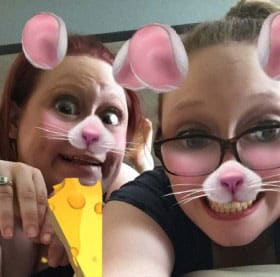Q & A: Finding community with a rare diagnosis

 Jordyn Cleveland was born deaf. In 2013 her and her family found out why. At the age of 13, Jordyn was diagnosed with Usher syndrome a genetic condition that worsens over time and will further affect her vision. In an effort to expand their support, Jordyn and her mother Mandy recently attended the Usher Syndrome Family Conference in Seattle where they were able to connect with other individuals and families impacted by the same rare diagnosis. Stone Soup Group recently spoke to Mandy about her experience.
Jordyn Cleveland was born deaf. In 2013 her and her family found out why. At the age of 13, Jordyn was diagnosed with Usher syndrome a genetic condition that worsens over time and will further affect her vision. In an effort to expand their support, Jordyn and her mother Mandy recently attended the Usher Syndrome Family Conference in Seattle where they were able to connect with other individuals and families impacted by the same rare diagnosis. Stone Soup Group recently spoke to Mandy about her experience.
Can you tell us a little bit about the conference and why you went?
I attended the conference because I had not been to one since Jordyn was diagnosed a few years back and it was in Seattle so it would not be this close in a while! Mainly I went for the connections with other families and for Jordyn to find connections too since it is a rare genetic condition. This was the first time it was sold out for registration which was for 200 people. It was a one day conference where we learned about research being done and what is upcoming in the near future that may be available for certain individuals with Usher’s.
What was the most beneficial thing you took away from the trip?
It was beneficial for me to see the adults who have Usher’s because I have only met a few people who have children diagnosed with it. They were able to give us information about struggles and incite to living with Usher’s. Also the connection with young adults that have it that are slightly older than my daughter Jordyn who could give advice about things like driving, education, independent living, jobs etc. Jordyn was able to connect with other teens around her age that are affected by Usher’s Syndrome. It made it more tangible knowing she is not alone in this and they are all in contact at this point.
Can you tell us about the people you met?
One young woman, Clare, was on a panel and described being in a depression for a couple of years after finding out about her diagnosis until her senior year in high school when things turned around and she was able to accept it and move forward. It was good to hear this because it was real, having been deaf and then receiving a diagnosis that will leave you blind is scary to come to terms with, it is for me as a parent and for my daughter Jordyn too. She explained how she is getting ready to go to college and excited for her future.
With this type of diagnosis, I imagine there is all kinds of support you seek, doctors, Google…. What makes peer support unique?
This was unique in that there were people from all over but we all had an instant connection of this diagnosis touching our lives, you don’t have to explain things about why things are difficult, we all know and understand ….. it is hard to put into words but it feels like a family reunion, you may not all know each other but you know you are all somehow all connected.
Is it difficult being in Alaska with a smaller and more spread out population and possibly fewer people to connect with? How do you navigate that?
It is hard being in Alaska where I know of four families in the state who have this diagnosis or have children with this diagnosis. We travel to Portland once a year at this point to track any progression in vision loss and to see the specialist. Having the availability to things like Facebook groups, and blogs from other families who have children with this syndrome is helpful and we are able to find support via technology.
Is there anything you would like to share with others if they are processing, working through a diagnosis?
Yes, it is hard at first, you go through a grieving process of the life you imagined for your child, I had a much easier time with the diagnosis of profound deafness when she was 6 months old because she was three months early and I was happy she was alive. I was a Parent Navigator here at Stone Soup Group when our family received the diagnosis of Usher’s Syndrome. I had heard of Ushers and actually was researching supports and resources for a family when I made the first connection…the symptoms of type 1 were everything that Jordyn had experienced that could not be explained, the balance issues even to this day, the bilateral profound deafness since birth, late to sit up on her own, late to walk (about 18 months). This with the question the optometrist brought up recently about her eye scan changing over the last year set off alarms in my head and I scheduled an appointment with the pediatric ophthalmologist here in Anchorage who confirmed that this did not look “normal” and sent us to Casey Eye Institute in Portland. After another 6 months of waiting for an appointment and a year for genetic testing results, we were able to confirm Usher’s Syndrome type 1. This diagnosis was very hard to take, being there with my then 13-year-old daughter discussing how she will need to come yearly to track her vision and loss to her peripheral vision. This did not seem fair, she had already gone through so much in her young life, what would she do as an adult with limited to no vision, how would she be independent? I still worry about this but I know she will find her way, meeting others who have gone through this or are going through this now helps, also knowing that there are things we can do to prepare for the future. It is hard to have a new diagnosis and it can take time to settle in but the quicker you come to terms with it, the sooner you can take action steps. I find myself explaining to Jordyn when she is having a hard time letting her know none of us know what the future holds, all we can do is take it day by day. We are on the Usher’s Syndrome registry to update us on any clinical trials and research opportunities, we have hope that researchers will find a way to slow the progression or treatments.
Do you have anything you would like people to know who may be less familiar with special needs or the “disability world”?
Yes, if you see my daughter you probably wouldn’t think she has special needs, you may see her signing with me or others and come to the conclusion that she is deaf but someone would never think she has a diagnosis that will take away her vision in addition to her deafness. You can never assume with special needs, some are very visible, some are not. Her special need does not limit her dreams or goals, I have high expectations for her and know that this is just another challenge she will take on. Having a child with special needs can be tough at times but it also has brought me into a world I would never have thought I fit into, you find the joy and humor in little things and it has taught me not to take life so seriously. Also, that each and every one of us have strengths and weaknesses and to focus on the positives.

